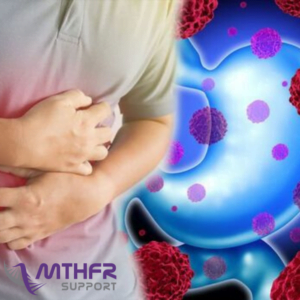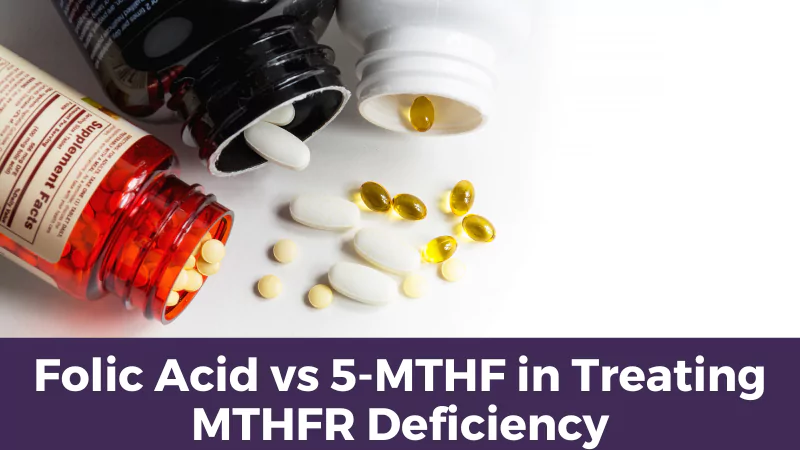Methylation can be defined as a vital biochemical process which is required for the proper functioning of our body. It involves the addition of a methyl group to a molecule which acts as a biological switch for certain activities like energy production, detoxification, DNA repair, regulation of gene expression, detoxification and synthesis of several neurotransmitters. It can act as a control mechanism to activate or deactivate multiple processes of our body. Any mutation in MTHFR can cause the MTHFR enzyme to slow down, thus affecting the methylation process. This condition can result in various disorders and poor health. (1)
Functions of Methylation:
Methylation is generally responsible for any change occurring in gene regulation and expression. It ensures that only a single allele should be expressed for a specific gene. This process is known as imprinting. In the case of failed imprinting, it can result in a spectrum of diseases. (2)
Methylation generally acts as a suppressor for many of the gene regulatory elements such as insulators, promoters, enhancers and repressors. It also plays a significant role in maintaining the integrity of chromosomes and homeostasis of organisms.
Methylation and MTHFR genetic mutation:
Any defect in the MTHFR enzyme may cause under methylation. This under methylation can lead to insufficient folate conversion which can further cause limited methyl groups conversion, thus resulting in accumulation of toxic elements such as heavy metals and other chemicals.
Also, due to C667T homozygous mutation of the MTHFR gene, there is an elevation in the level of homocysteine. This elevated homocysteine, if not converted to methionine, has been implicated in many disease states like cardiovascular diseases, mental health disorders like alzheimer’s disease, parkinson’s disease, depression and dementia. It can also cause fetal neural tube defects. Other obstetric complications include recurrent pregnancy loss and placental vasculopathy such as abruption and pre-eclampsia. (3,4,5)
How does it happen?
A universal methyl donor known as SAMe (S-adenosylmethionine) provides methyl groups to the body. The production of SAMe is managed by 5-MTHF, which is our active folate, for the adequate working of the methylation cycle. But due to a gene mutation which occurs in the MTHFR gene, sufficient 5-MTHF is not produced in our body leading to the inefficient methylation cycle. (6)
Watch Webinar : Introduction to the Methylation Cycles Course
Abnormal methylation and diseases:
Methylation patterns are very important to human health and research has identified that a severe lack of methylation is involved in diseases like:.
- Immunodeficiency, centromeric, instability and facial dysmorphism (ICF) syndrome – it is a rare autosomal recessive disorder which is mainly described by some mild facial abnormalities and immunodeficiency.
- Rett syndrome – it is an X-linked neurodevelopmental disorder. It generally affects females and exhibits mental retardation and autistic behaviour.
- Beckwith Wiedemann syndrome (BWS) – it is marked by various growth abnormalities such as macroglossia, visceromegaly, hemihypertrophy and gigantism.
A lack of methylation may be associated with the following symptoms: Under methylation is generally linked with mental illness and anxiety attacks. It may be linked with MTHFR mutations C677T, A1298C, BHMT, MTR, SAHH and MAT.
Some common symptoms seen in people with under methylation are:
- Fatigue
- Insomnia
- Depression
- Addictions
- Obsessive-compulsive disorders
- Seasonal allergies
- Delusions
- Low threshold for pain
- Digestive issues
- Frequent headaches
- High libido
- Self-motivation
- Strong will
- Perfectionism
Several other factors like nutritional deficiencies, exposure to toxins, environmental factors and trauma also play a contributory role as methylation keeps our biochemistry kicking over to support us in times of stress and so the more environmental exposures and toxins we are exposed to the harder we have to fight to get back to normal. This is why MTHFR mutations can affect us so significantly. (7)
In the case of undermethylation, several precursors like Copper, Folate, Zinc, Magnesium, Choline and Vitamin B may need to be added and certainly should be checked regularly in blood work and included in your diet. Various food items which help in enhancing the methylation process are fresh vegetables, full-fat yoghurt, grass-fed beef, wild salmon and eggs while processed foods, vegetable oils, soy and gluten should be avoided. (7)
Under utilisation of methyl groups.
I don’t like the term “Over methylation”. I think what the issue is, is under utilisation. We create methyls but because of a variety of reasons we are not able to use them. That might be because of gut, mold, infections, viruses, low Vitamin B12, low detoxification capacity and this can cause a person to become more sensitive and reactive;
Some common signs and symptoms which are seen in the people with over methylation are:
- High anxiety and hyperactivity
- Rapid speech
- Low libido
- Dry eyes and mouth
- Low motivation
- Self-mutilation
- Paranoia and paranoid schizophrenia depression
- Sleep disorders
- High threshold to pain
- Eczema
- No seasonal allergies
- Artistic or musical ability
- Obsession without compulsion
- Pacing and nervous legs
The secret here is to find out WHY methylation is blocked, clear the reason and improve the way the person uses their folate. Sometimes we even try to slow down the production of methyls to take the pressure off initially.
Some common signs and symptoms which can indicate methylation support is needed:
- Infertility or pregnancy-related complications- methylation helps in promoting foetal growth and maintaining a healthy pregnancy. Multiple miscarriages are a big red flag that there is a problem with methylation.
- Hormonal imbalances- methylation plays an essential role in detoxifying and metabolising estrogen. Hence, it can lead to PCOS (polycystic ovarian syndrome), PMS (premenstrual syndrome), fibroids and endometriosis etc.
- Mental health disorders- methylation is responsible for many mood modulating neurotransmitters such as adrenaline, dopamine, serotonin and noradrenaline. If there is a disturbance in any of the neurotransmitter levels then it can have a negative impact on our mood and mental health leading to anxiety, depression, obsessive compulsive disorder, schizophrenia and much more.
- Cardiovascular disorders- methylation helps in the regulation of levels of homocysteine. If there is an increase in the level of homocysteine then it can result in inflammation and free radical damage.
- Autoimmune disorders- Methylation is very crucial for the regulation and repair of the immune system.
- Histamine intolerance- allergies are caused due to enhanced production of histamine and result in various symptoms such as itching sneezing watery eyes and running nose. This excess histamine is controlled by the methylation process.
- Memory problems- Homocysteine can damage our neurons and result in inflammation. To prevent any memory problem, our body needs to produce more melatonin and serotonin which happens through methylation. The key nutrient for our brain is phosphatidylcholine and this can only be produced via methylation.
- Chronic fatigue- methylation helps in the production of energy and maintains the functioning and the health of various organs such as thyroid gland, adrenal gland and also enhances the nervous system.
- Inflammatory conditions- Continuous inflammation can affect your body and availability of methylated molecules in the body
- Digestive problems- poor bile production can result in digestive problems as bile has antimicrobial properties and prevents the overgrowth of bacteria. It also helps in increased absorption of fat and other nutrients. (8)
Improving the methylation:
It can take up to 3-4 months to correct any methylation defect. Several lifestyle modifications can also enhance the methylation process in the body like increased physical activity and improved dietary habits. Some food which helps in improving the methylation in the body includes avocado, brussels sprouts, broccoli, asparagus, legumes, green leafy vegetables etc. Also, excessive consumption of alcohol and caffeinated products should be avoided.
FREE Download What is MTHFR eBook
If you suspect you have a methylation issue, why not contact the clinic
If you have had miscarriages and suspect that MTHFR and methylation might be playing a part in your infertility, why not do our 10 day FREE course or take our Quiz to see if you might have an MTHFR mutation.
Sources:
- MTHFR, Methylation and Histamine in Psychiatric Conditions [Internet]. Psychology Today. [cited 2020 Jan 27]. Available from: https://www.psychologytoday.com/blog/holistic-psychiatry/201711/mthfr-methylation-and-histamine-in-psychiatric-conditions
- Kandi V, Vadakedath S. Effect of DNA Methylation in Various Diseases and the Probable Protective Role of Nutrition: A Mini-Review. Cureus [Internet]. [cited 2020 Feb 6];7(8). Available from: https://www.ncbi.nlm.nih.gov/pmc/articles/PMC4582005/
- What is Methylation? | MTHFR Support Australia [Internet]. MTHFRSupport Australia. 2017 [cited 2020 Jan 27]. Available from: https://mthfrsupport.com.au/2017/02/what-is-methylation/
- Ganguly P, Alam SF. Role of homocysteine in the development of cardiovascular disease. Nutr J [Internet]. 2015 Jan 10 [cited 2020 Feb 6];14. Available from: https://www.ncbi.nlm.nih.gov/pmc/articles/PMC4326479/
- Hague WM. Homocysteine and pregnancy. Best Pract Res Clin Obstet Gynaecol. 2003 Jun;17(3):459–69.
- What is Methylation and Why Should You Care About it | Thorne [Internet]. [cited 2020 Jan 28]. Available from: https://www.thorne.com/take-5-daily/article/what-is-methylation-and-why-should-you-care-about-it
- Is Undermethylation Keeping You Down? What You Can Do [Internet]. Jill Carnahan, MD. 2018 [cited 2020 Jan 27]. Available from: https://www.jillcarnahan.com/2018/07/05/is-undermethylation-keeping-you-down-what-you-can-do/
- 10 Signs You Need Methylation Support [Internet]. BioCare. 2018 [cited 2020 Jan 23]. Available from: https://www.biocare.co.uk/news/10-signs-you-need-methylation-support.html













